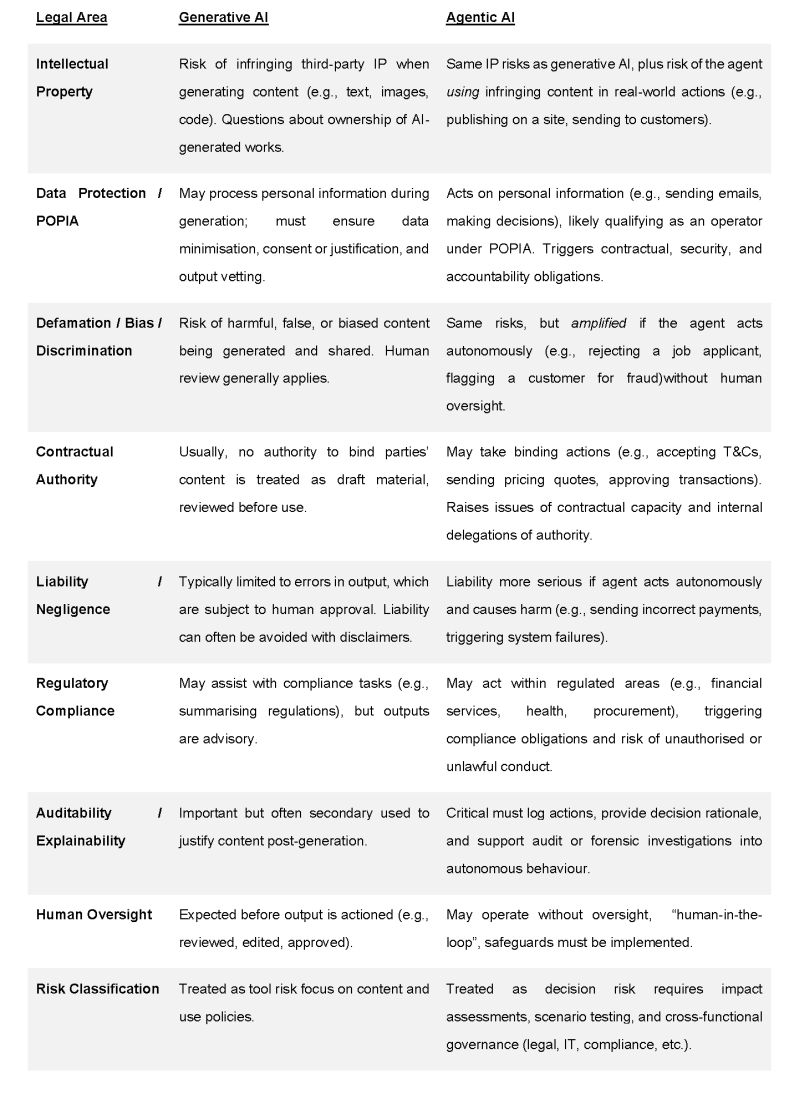- within International Law, Law Department Performance and Consumer Protection topic(s)
Artificial Intelligence ("AI") has become a transformative force in various industries, offering unprecedented capabilities and efficiencies. Much of the public conversation has been dominated by generative AI, systems like ChatGPT that can produce realistic text, images, code, and more. However, an equally important development is the rise of agentic AI, systems that don't just generate content, but autonomously act toward goals in the real world. Both agentic AI and generative AI stand out due to their unique functionalities and implications. In this article, we aim to draw a distinction between agentic AI and generative AI, explore the legal and ethical considerations associated with these technologies, and provide guidance on how businesses can mitigate potential risks.
Agentic AI: What is it?
Agentic AI refers to AI systems that possess the ability to make autonomous decisions and take actions based on those decisions. These systems are designed to operate independently, often mimicking human-like decision-making processes. Key characteristics of agentic AI include:
- Autonomy: Agentic AI systems can perform tasks without human intervention, making decisions based on pre-defined criteria or learned experiences.
- Adaptability: These systems can adapt to new situations and environments, learning from interactions and improving their performance over time.
- Goal-Oriented: Agentic AI is typically programmed to achieve specific objectives, whether it be optimising processes, solving complex problems, or interacting with humans in a meaningful way.
Think of an AI meeting assistant that scans your emails, proposes meeting times, books slots in your calendar, and reschedules if something changes, without being prompted each time. Or consider an AI Ops tool that monitors IT systems, detects outages, diagnoses the issue, and automatically restarts affected servers. These are examples of agentic AI: systems that go beyond generating responses and instead take real-world actions to pursue a defined goal.
There is also the autonomous vehicle that navigates traffic to get you to the airport, adjusting in real time to road conditions. Or a finance automation agent that reviews invoices, approves expenses below a threshold, and posts them to your general ledger, all without waiting for human instruction. These systems act on your behalf, often continuously, using reasoning, planning, and execution capabilities. That's what makes them agentic, not just generative.
Generative AI: What is it?
Generative AI, on the other hand, focuses on creating new content, such as text, images, music, or even code, based on the data it has been trained on. Unlike agentic AI, generative AI does not make autonomous decisions but rather generates outputs that can be used for various purposes. Key characteristics of generative AI include:
- Creativity: Generative AI excels in producing novel and diverse outputs, often indistinguishable from those created by humans.
- Pattern Recognition: These systems analyse patterns in the training data to generate new content that adheres to similar structures and styles.
- Versatility: Generative AI can be applied across multiple domains, from artistic creation to scientific research, enhancing productivity and innovation.
Here is a nice mental shortcut to distinguish between the two:
- Generative AI is like a smart intern: "Give me a task, and I'll produce something."
- Agentic AI is like a junior manager: "Tell me the goal, and I'll figure out the steps, carry them out, and report back."
Legal Considerations
As businesses adopt AI, the legal risks differ significantly depending on whether the system is generative or agentic. Generative AI, like a chatbot or content generator, raises concerns around intellectual property infringement, data privacy, bias, and transparency. However, these risks are typically contained to the output generated and can often be mitigated through human oversight before publication or use.
Agentic AI, by contrast, introduces a far broader legal risk surface. Because these systems act independently (whether booking meetings, approving transactions, or adjusting IT infrastructure), they can cause real risk through incorrect, biased, or misaligned actions. The legal implications now shift from content risks to conduct risks. Think of it this way: The same AI that generates a contract clause is fundamentally different from one that sends that clause to a counterparty and commits to terms.
The deployment of agentic AI and generative AI raises several legal issues that businesses must address to ensure compliance and mitigate risks:

Mitigation Strategies for Businesses
To mitigate the risks associated with agentic AI and generative AI, businesses can adopt the following strategies:
- Risk Assessment: Conduct thorough risk assessments to identify potential legal and ethical issues related to AI deployment. Catalogue each AI system in use. Ask: Does it generate content, or does it also act? For agentic use cases, assess the nature of the actions and systems it interacts with.
- AI Governance Framework: Develop or update comprehensive internal policies that address liability, intellectual property, data privacy, and ethical considerations. Include guidance on responsible use, internal approvals, risk classification, and continuous monitoring.
- Update Contracts and Procurement Policies: Incorporate AI-specific provisions into contracts with vendors and third-party developers. This includes warranties on training data and system behaviour, audit rights, liability for autonomous acts, and requirements for oversight, explainability, and safe shutdown.
- Review Operator Roles under POPIA (and any other privacy framework that is applicable to your business): Agentic AI that processes personal information, especially if it interacts with external parties or makes decisions affecting data subjects, is likely to be classified as an operator under POPIA. This triggers specific obligations around agreements, security measures, and data subject rights. Privacy impact assessments must be done together with the risk assessments described above.
- Define Clear Delegation of Authority: For any AI system that takes real-world actions, ensure that the scope of its decision-making is expressly defined in writing, just as you would for a human delegate. Document escalation paths, fallback mechanisms, and human-in-the-loop triggers for critical decisions.
- Training and Education: Invest in training programmes to educate employees about AI technologies, their implications, and best practices for ethical use.
- Monitoring and Auditing: Implement continuous monitoring and auditing processes to ensure AI systems operate within legal and ethical boundaries.
- Stakeholder Engagement: Engage with stakeholders, including customers, employees, and regulators, to gather feedback and address concerns related to AI deployment.
Agentic AI and generative AI offer immense potential for innovation and efficiency, but they also present significant legal and ethical challenges. By understanding the distinctions between these AI types and proactively addressing the associated considerations, businesses can harness the power of AI while mitigating risks and ensuring responsible use. Through careful planning, policy development, and stakeholder engagement, companies can navigate the complexities of AI and leverage its benefits for sustainable growth and success.
The content of this article is intended to provide a general guide to the subject matter. Specialist advice should be sought about your specific circumstances.



